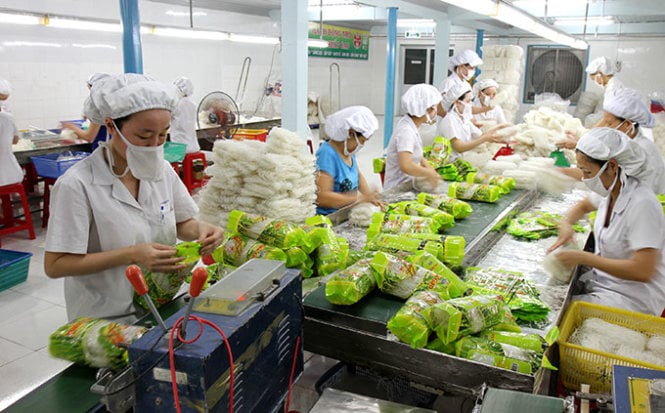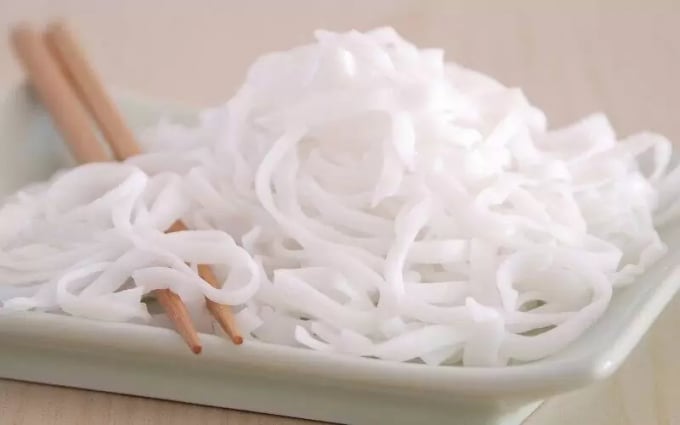June 19, 2025 | 04:22 GMT +7
June 19, 2025 | 04:22 GMT +7
Hotline: 0913.378.918
June 19, 2025 | 04:22 GMT +7
Hotline: 0913.378.918

Products made from rice such as vermicelli, rice noodles, and pho of Vietnam are well received by the EU, US, and Japanese markets.
On June 13, 2022, the European Union (EU) announced the amending Implementing Regulation (EU) 2019/1793 on the temporary increase of official controls and emergency measures governing the entry into the Union of certain goods from certain third countries implementing Regulations (EU) 2017/625 and (EC) No 178/2002 of the European Parliament and of the Council
The new regulation excludes pho, rice noodles, and vermicelli originating from Vietnam from the list of regulations requiring additional food safety certificates according to Annex 2 to Implementing Regulation (EU) 2021/2246, amending to Implementing Regulation (EU) 2019/1793.
On July 3, 2022, the new legislation on measures to regulate food exports to the EU will come into effect. Following the time, consignments of pho, rice noodles, and vermicelli exported to the EU do not need to be accompanied by a certificate of food safety issued by the Ministry of Industry and Trade.
EU remains the requirement for food safety certificates accompanying instant noodles and dragon fruit of Vietnam, given the fact that instant noodles contain spices and other ingredients and additives. While consignments of dragon fruit from Vietnam show a high frequency of non-compliance with the relevant requirements provided for in Union legislation concerning contamination by pesticide residues was detected during official controls performed by the Member States by Annex II to Implementing Regulation (EU) 2019/1793.
It was required to increase the frequency of identity and physical checks to be performed on such consignments to 20 %.
For some other agricultural products, the EU maintains a frequency of inspection of 50 percent for Coriander leaves, basil (holy, sweet), mint, parsley (Food – fresh or chilled herbs), and Okra ( Food – fresh, chilled, or frozen ), and Capsicum peppers.
Before exporting instant noodles and dragon fruit, Vietnam's competent state management agencies must inspect the production process and collect samples for testing according to the EU's guidance. This is the foundation for issuing the Food Safety Certificate.

Rice noodles, vermicelli, and pho products will not need a Food Safety Certificate accompanied when exporting to the EU, from July 2022.
As the focal unit of Vietnam in implementing the SPS Chapter Commitments of the Vietnam-European Union Free Trade Agreement (EVFTA), beginning in January 2022, the Vietnam SPS Office has proposed several plans to facilitate the removal of barriers to the export and import of agricultural products and to ensure the safety of agricultural products on both sides.
SPS Vietnam replied to the EU's new legislation about temporarily increasing the frequency of food safety checks for dragon fruit, increasing the frequency of testing spices, okra, and chili, and requiring extra certification with the criterion of ethylene oxide in constant foods.
SPS Vietnam agreed to give an update on implementing the SPS commitment of the EVFTA and to update the list of Vietnamese agricultural exporters qualified for exporting commodities to the EU and vice versa.
At the beginning of May 2022, SPS Vietnam Office, in collaboration with the Department of Plant Protection, representatives of the Ministry of Industry and Trade, and other units, met with the Delegation of the European Union to Vietnam and technical units to discuss solutions to problems relating to the reduction of inspection frequency for Vietnamese dragon fruit and instant noodles.
Mr. Ngo Xuan Nam, Deputy Director of the Vietnam SPS Office, said the following: "We acknowledge the EU's assistance over the past time, especially the meeting of the SPS Sub-Committee of the Joint Committee to implement the EVFTA. We look forward to reaching an agreement on a solution and progress for the EU to lower the frequency of inspections of agricultural goods and food from Vietnam, particularly dragon fruit and instant food."
To achieve the goal of reducing the frequency of inspections of instant foods and dragon fruit, the SPS Vietnam Office encourages Vietnamese businesses to strictly comply with registration and certification requirements from the appropriate authorities and to closely monitor residue levels in exported products.
As a result of the Ministry of Industry and Trade's prompt establishment of a department specializing in the issuance of Certificates of Food Safety for the group of rice noodles, pho, and vermicelli, as well as its prompt direction and effective coordination with the Vietnamese Trade Office in Europe, the European Union (EU) acknowledged the Ministry's and Vietnam's efforts to control food safety and consequently amended its regulations on emergency control of foods.
Translated by Linh Linh

(VAN) To address plastic pollution, closing the plastic recycling cycle will bring significant economic and environmental benefits.

(VAN) According to the Binh Thuan Department of Industry and Trade, in the first five months of 2025, Binh Thuan's dragon fruit export turnover increased by 20.65% compared to the same period last year.

(VAN) EU countries on Thursday gave final approval to new tariffs on fertilizer imports from Russia, a move aimed at cutting off revenue that could support Moscow’s war in Ukraine, despite concerns from European farmers.

(VAN) The working delegation from the Ministry of Agriculture and Environment conducted an important trip to the Netherlands to strengthen strategic partnerships and sustainable development in the agricultural sector.

(VAN) The letter ‘A Plea from the Ocean’ not only evokes emotion but also awakens the human conscience to the responsibility of protecting life on Earth.

(VAN) The Department of Agriculture in South Africa has announced the country’s first mass vaccination of poultry to prevent local birds from contracting avian influenza.

(VAN) Establishment of the Mekong Delta Regional Agricultural Linkage Center, aiming for a closed value chain, deep processing, trading platforms, and international market connectivity.